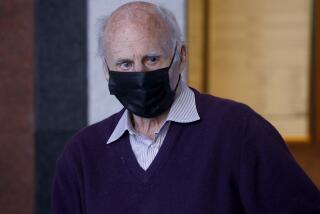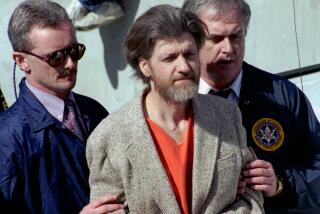Kaczynski Begins Tests to Evaluate Competence
- Share via
SACRAMENTO — After months of steadfastly refusing to cooperate with government mental health experts, accused Unabomber Theodore Kaczynski on Monday submitted to an exam by a court-appointed psychiatrist--a move that could pave the way for a plea bargain agreement.
Legal experts, including a former federal prosecutor, said Kaczynski’s cooperation could be a turning point in the trial--even if the former UC Berkeley mathematics professor is found mentally competent to stand trial.
They say an examination is likely to spotlight Kaczynski’s suspected mental illness, possibly providing federal prosecutors a graceful way to accept a plea bargain under which Kaczynski would plead guilty in exchange for a sentence of life in prison. The government is now seeking the death penalty.
In the past week, prosecutors have faced criticism for refusing to accept a deal with Kaczynski, who has pleaded not guilty.
But if they accept a deal for a life sentence, the decision could trigger an intense reaction from bombing victims and their families.
The trial has been delayed at least until Jan. 22 while Kaczynski undergoes a competency evaluation by Dr. Sally Johnson, a North Carolina-based U.S. Bureau of Prisons psychiatrist, at the Sacramento County Jail.
“From the information we have, everything’s going fine,” said Sgt. Jim Cooper, a spokesman for the Sacramento County Sheriff’s Department who said the doctor was at the jail for hours.
Cooper said the evaluation--ordered Friday by U.S. District Judge Garland E. Burrell Jr.--took place in a section of the jail usually reserved for lineups of suspects.
Kaczynski’s attorney, Quin Denvir, said Johnson “met with him in the morning and afternoon, and he’s cooperating.” Denvir said the defense lawyers were present at the beginning of the interview and then left.
Some legal experts have begun to question whether Burrell, who has a reputation among lawyers for being extremely deliberative, could have avoided the chaotic trial breakdown by ordering a competency exam much sooner.
Burrell did not formally order the exam until after Kaczynski apparently tried to commit suicide last week and sought to serve as his own attorney. Kaczynski remains under 24-hour suicide watch.
A competency exam is “typically something you do sooner, rather than later,” said George O’Connell, a former U.S. attorney in Sacramento, who was nonetheless hesitant to criticize Burrell.
Kaczynski was arrested in April 1996 at his shack in the woods of Montana. He was charged in the bombing deaths of Sacramento computer store owner Hugh Scrutton and timber industry executive Gilbert Murray and in attacks that injured a geneticist and a computer scientist.
The government alleges that Kaczynski is the anti-technology Unabomber and is responsible for a string of bombings starting in 1978 that resulted in three deaths and 29 injuries across the nation.
Last summer, Kaczynski’s attorneys first indicated they might seek testimony from mental health experts about Kaczynski’s condition, which they suggested prevented him from forming the necessary criminal intent to commit the attacks.
The standard for legal competence is much narrower than that for insanity. If Kaczynski is found capable of understanding the charges against him and is able to assist in his defense, he would be found competent to stand trial.
Prosecutors never sought a formal competency hearing, according to Leesa Brown, a spokeswoman for the prosecution.
On Nov. 21, under questioning from Burrell, Denvir said he was not asking for a competency hearing either.
“We’re convinced that Mr. Kaczynski understands the nature of the proceedings, the role of counsel in the court and we’ve been able to accommodate the effects of [mental] illness in obtaining the information we need to evaluate and prepare his defense,” Denvir told the judge.
The maneuvering in the Kaczynski case is not without precedent.
“It’s not uncommon to put on a mental defect defense and not have the client examined for competence,” said Maria Stratton, the federal public defender in Los Angeles.
“The judge, I think, is really being appropriately careful because Mr. Kaczynski has the constitutional right to be his own lawyer. He may do a terrible job at it. He may do a great job,” Stratton said. “The judge wants to make sure that whatever mental defect he might have is not interfering with his ability to understand what’s going on right now.”
Friday, a clearly impatient Burrell ordered the examination, saying the apparent suicide attempt left him no option. Burrell also indicated last week that if Kaczynski is found competent, he probably will let him go forward as his own attorney.
Kaczynski’s competency interviews will last a week. “The key now is what the psychiatrist finds,” said a U.S. Justice Department official who spoke Monday on the condition of anonymity.
Acknowledging that the examination is not for insanity but for competence, the official noted that in the course of the evaluation something may come up--”new facts that may bear on the decision” to accept a plea that rules out the death sentence. These could be new facts that U.S. Atty. Gen. Janet Reno and Justice Department officials will want to look at.
“The issue is whether the government will use this competency test as a legitimate raison d’etre to revisit the business of accepting a plea, and I think it will,” said Joseph E. diGenova, former U.S. attorney for the District of Columbia.
DiGenova, now in private practice in Washington and a frequent commentator on criminal law, said that “if the government gets some patina of coverage from the psychiatrist that he [Kaczynski] has some mental problem, this will let them revisit the question of a plea. The government needs to get a guilty plea in this case.”
“In a high-profile case, where you only have to give up the death penalty, it’s a win-win situation for the government,” diGenova said. Otherwise, “with a defendant whose mental state is questionable but who ends up representing himself, you could have a jury pool that doesn’t want to be responsible for executing him.”
The Justice Department official joined another source in denying that over the weekend the government had turned down a plea offer.
No offer was made; the defense on Friday raised the question of more discussions and the government did not reject that. Nothing more has taken place, the official insisted.
As for the conditional plea offer that the government turned down last month, a source familiar with the case said the strings attached to the offer were subject to negotiation.
Asked about any plea bargain discussions, Denvir said Monday: “We have nothing to say about any pleas.”
Mark O’Sullivan, an FBI chaplain who speaks on behalf of Gilbert Murray’s family, said the family has not issued a statement on plea bargaining. “They haven’t been told anything. That’s the bottom line,” he said Monday.
The prosecution has been criticized in some editorials for declining to enter into a plea bargain, setting off a debate in which other commentators have urged the Justice Department to stay with the death penalty.
Sacramento Dist. Atty. Jan Scully said she could not immediately say whether her office would charge Kaczynski with a capital crime if the Justice Department entered into a plea bargain that would send Kaczynski to prison for life. No state charges are currently pending.
“I’d like to believe that [they] . . . will continue on their course to seek the death penalty. It took them so long to arrive at the decision to seek the death penalty. So it’s surprising that after a couple of days of antics by him [Kaczynski] that he would have his way.”
Gladstone reported from Sacramento and Ostrow from Washington.
More to Read
Sign up for Essential California
The most important California stories and recommendations in your inbox every morning.
You may occasionally receive promotional content from the Los Angeles Times.













